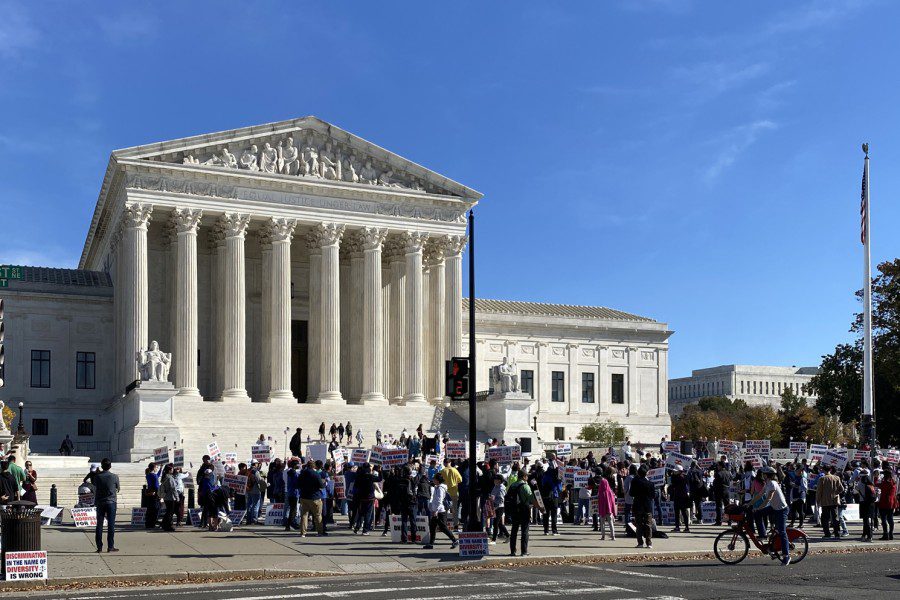What the Supreme Court’s impending affirmative action decision means for NYU
NYU and other universities may be prohibited from considering race in admissions decisions after the U.S. Supreme Court rules on two cases next June.
People protesting affirmative action in college admissions gather in front of the U.S. Supreme Court in Washington, D.C., on Oct. 30. (Edward Franco for WSN)
November 2, 2022
The U.S. Supreme Court heard two cases this week that will decide whether race-sensitive college admissions processes are constitutional — a decision that may prohibit universities from considering race in their admissions decisions. Although NYU is a private university, its admissions processes may still be affected by the court’s ruling, which will likely be issued in June next year.
The court seems likely to rule against race-based affirmative action, despite a decadeslong history of voting in its favor. Students for Fair Admissions, a group of students and parents that filed both lawsuits challenging race-sensitive admissions practices, claims that admissions processes at Harvard University penalize Asian American applicants and disadvantage white and Asian American applicants at the University of North Carolina at Chapel Hill.
Lisa Stulberg, a professor at the Steinhardt School of Culture, Education, and Human Development whose area of expertise includes affirmative action in higher education, said that most research shows that broad racial diversity is only achievable through race-conscious affirmative action. Stulberg thinks race-sensitive admission is in jeopardy.
“I do not know if the court will fully strike down its own multiple rulings — since the 1970s — that have allowed for a narrowly-tailored and holistic consideration of race in admissions,” Stulberg said. “But if it does, I know that NYU and schools like it will have our work to do to find ways to meet our commitments that are in line with the court’s assessment of what is constitutional.”
Though the court has allowed academic institutions to consider the race of an applicant in admissions decisions so far, the court’s current conservative majority may cause that to change. Justice Ketanji Brown Jackson, one of only three liberal justices, has recused herself from the decision for the Harvard case due to her ties to the school, though she will participate in the decision for the UNC-Chapel Hill case.
Both cases were first filed in 2014, and made their way to the Supreme Court after being heard by district and appellate courts that upheld race-sensitive affirmative action.
NYU president Andrew Hamilton said that overturning these decisions would be a step backward for higher education in the United States, and a concerning interference in universities’ admissions processes in an Oct. 31 statement.
“It will be the most consequential case for higher education in nearly 20 years,” Hamilton said. “At NYU, we hold diversity to be a core value. It makes our university stronger, our campus more vibrant, our teaching and learning more powerful, our scholarship sharper and more nuanced, and our mission as an engine of social mobility more successful.”
Hamilton also noted that the American Council on Education and 38 higher education institutions, including NYU, filed an amicus brief — information provided to the court by a party outside of a case — for both cases in 2015. In the brief, the 39 parties argued that a ban on considering race in college admissions could disadvantage minority applicants.
NYU considers the race and ethnicity of applicants in its undergraduate admissions process. In a 2017 statement to WSN, former admissions dean Shawn Abbott said that the university does not use quotas for underrepresented students but that it may use affirmative action for academically competitive students.
Opponents of race-conscious affirmative action have argued that it discriminates against certain groups and that universities should base admission decisions on other factors. LS sophomore Jessica Wang said she thinks that universities should not focus on race, and instead look at factors such as academics and personality traits in their admissions decisions.
“I don’t think race should be considered in the process of admissions because, also considering gender, it’s just your identity,” Wang said. “It shouldn’t be part of your decision to come into school. A college should admit students based on how capable they are of fitting into the school and their capability of learning and fitting into that environment. Their race shouldn’t be a factor.”
Since 1996, nine states have banned affirmative action in university admissions. It was first prohibited in California, and enrollment rates for Black and Hispanic students have since declined. There was minimal difference in admission rates for white and Asian American students before and after the ban.
LS sophomore Alexandra Przysucha said she supports the use of affirmative action practices in college admissions due to historical and social inequities among different groups.
“It’s important to have different people that are from different backgrounds,” Przysucha said. “It’s not fair necessarily for people who don’t have certain opportunities over others, who are just as equally worthy of the same education.”
Contact Carmo Moniz at [email protected].

























































































































































